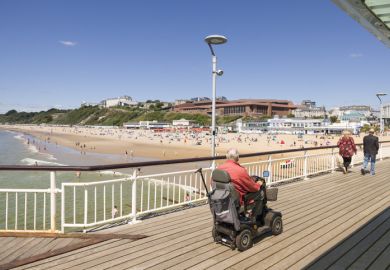- As an outspoken critic of higher education's dependence on the state, the vice-chancellor of the University of Buckingham covered familiar ground with his warning that the tradition of universities as self-governing institutions was being "destroyed". However, writing in The Independent on 26 June, Terence Kealey suggested that a point of tension between the Higher Education Funding Council for England and the sector - namely self-governing Oxbridge - was about to come to a head. Predicting that the University of Cambridge would fail a forthcoming assurance review over its unusual governance arrangements, he said: "Hefce is out of order ... If Cambridge has a traditional yet effective method of government, it should not interfere."
- Advice not to interfere would have served a Sheffield physicist well when he decided to challenge a £60 speeding fine in court. Iain Fielden, a researcher at Sheffield Hallam University, tried to prove that the speed camera that clocked his wife doing 36mph in a 30mph zone was inaccurate. He spent £5,000 on an appeal, and when that failed he was ordered to pay £15,000 in court costs, The Daily Telegraph reported on 26 June. Dr Fielden said: "I'm shocked about the costs. Based on all the information I had at the beginning, I was right."
- From one shocked academic to another, The Sun reported on a psychology lecturer's close encounter with a UFO. Simon Griffey, of Cardiff University, spotted strange lights over a village in the Brecon Beacons after soldiers in the area had reported a similar sighting. He told the newspaper on June: "There was no noise whatsoever, it was a bit eerie. I've driven over this mountain for 17 years and have never seen anything like it." He added: "I think it's plausible that there could be life on other planets."
- Universities will be "ordered to give preferential treatment" to pupils from struggling state schools ahead of their privately educated rivals, according to a government report. The study from the National Council for Educational Excellence urges universities to take into account "all available contextual data" about pupils' A-level performance, The Sunday Times reported on 29 June. The proposals mean that pupils from private schools will need better grades than those from poorly performing state schools to win places on the same course, the Daily Mail said. Critics warned that positive discrimination of this sort could damage the reputation of British universities internationally.
- The principal of the University of Glasgow, Sir Muir Russell, is to step down from the post. The former head of the Civil Service in Scotland has turned around the financial fortunes of the institution, but his cost-cutting efforts have also led to a tense relationship with staff, The Scotsman reported on 29 June. A major shake-up in 2006 claimed the jobs of 240 staff, but made savings of £10 million and brought the university back into the black. Sir Muir said he intended to retire in September 2009, when his contract comes to an end.
- Diplomas have received another bashing, this time from a think-tank that described them as a qualification for "refugees" from tougher academic exams. The study by the Nuffield Foundation, reported in the Financial Times on 30 June, comes after the Confederation of British Industry withdrew its support for the scheme. The think-tank warned that diplomas may be "unable to establish a high-status reputation". Meanwhile, The Daily Telegraph said a government report revealed that teenagers studying for diplomas will have to travel miles between lessons at different schools and colleges. Extra bus services and videoconferencing will be required, it reported, with ministers planning to spend £23 million helping pupils in rural areas get to classes.
Register to continue
Why register?
- Registration is free and only takes a moment
- Once registered, you can read 3 articles a month
- Sign up for our newsletter
Subscribe
Or subscribe for unlimited access to:
- Unlimited access to news, views, insights & reviews
- Digital editions
- Digital access to THE’s university and college rankings analysis
Already registered or a current subscriber?



